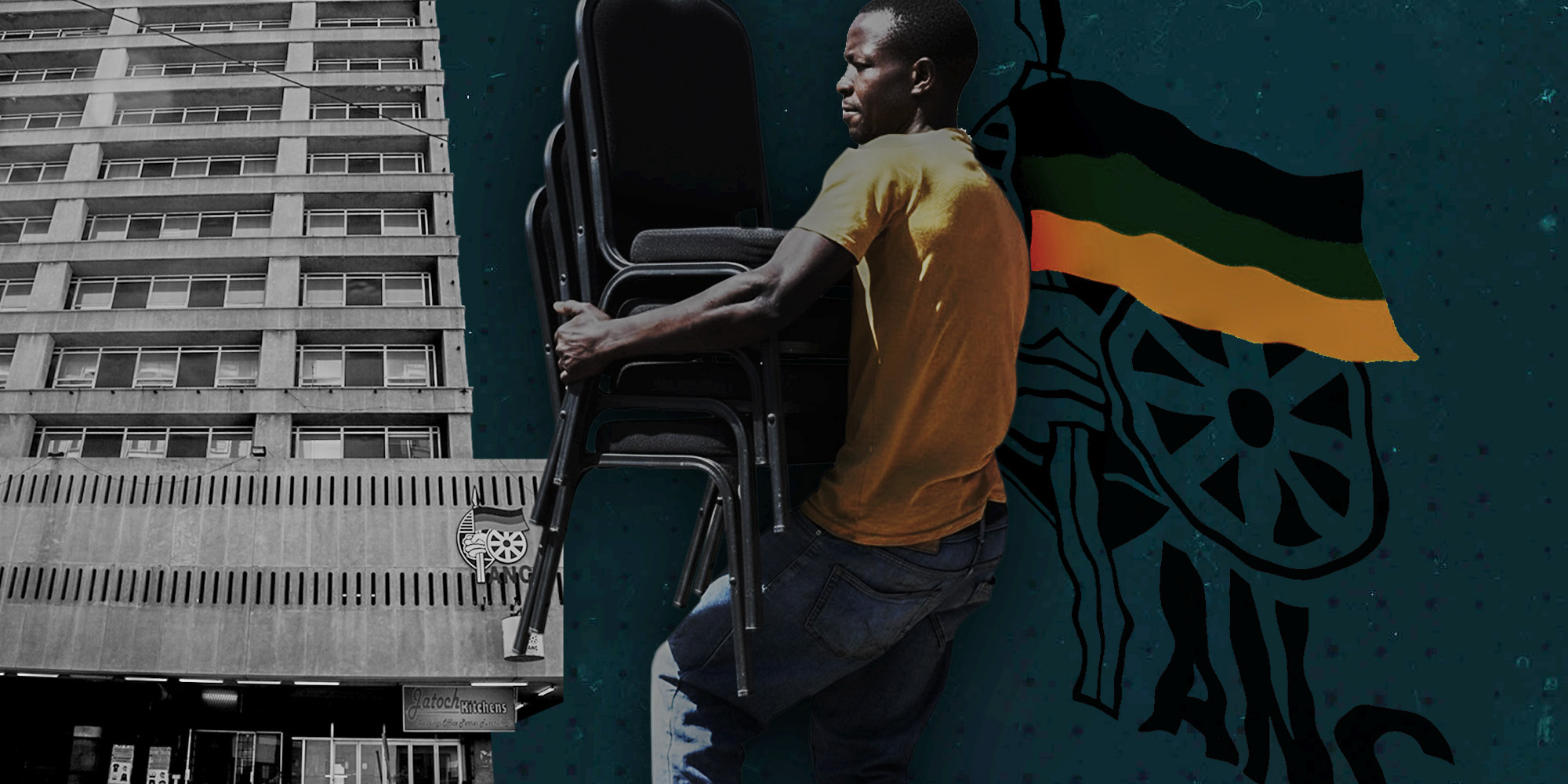With at least three bank accounts attached and payments stopped to settle an R85-million debt, the ANC also faces an insolvency application that could jeopardise more than R1-billion in public funds it receives as a represented party from the national fiscus and private donors.

Rapport first reported that the ANC had its bank accounts frozen and R140,000 of goods carted away from its Luthuli House headquarters last week. The graphic shows the detail.
This is insufficient to meet the party’s debt obligation to Ezulweni Investments, the company that provides the party with posters, banners and other election paraphernalia.
The Sheriff of the Court also attached at least three bank accounts, but the amount in them is unlikely to exceed R85-million, the amount due to Ezulweni after a protracted battle for payment.
ANC staff are committed, but they experience uneven salary payments, with the party sometimes forgoing debt payments to cover its salary bill or vice versa.
Should the ANC not pay up, the next step is an unprecedented insolvency application, lawyer Shafique Sarlie, who acts for Ezulweni, told Daily Maverick. He is also exploring the attachment of the party’s provincial office assets and accounts.
“An insolvency application is brought when a debtor cannot pay their debts and when that is in the best interests of its creditors. There isn’t a precedent [for a political party], but the same set of rules and considerations apply,” he said.
“The consequence is that the financial affairs are vested in the liquidator. The IEC [Electoral Commission of South Africa], for example, will not be able to pay an insolvent company.”
The ANC received R1.7-billion in funding from the fiscus and private donors, with the lion’s share from the public purse, in the last financial year.
A successful insolvency application would be parlous for the party ahead of 2026’s make-or-break local government election.
While the ANC settled to stave off a previous attachment by Ezulweni, it repeatedly reneged on payments, prompting the company’s owner, a loyal party member, to reapply last month for the attachment order to settle the substantial debt.
Now the ANC is fighting back.
“The ANC, through its legal representatives and forensic auditors, has formally notified the plaintiff [Ezulweni] about the novation of the court order. Tayfin Forensics has obtained a sworn affidavit from a former ANC employer who admitted to being bribed to falsely claim that Ezulweni delivered banners and advertising materials,” said the party.

Daily Maverick has shown evidence provided by the printing and design company that it had delivered on the 2019 election material. (See here.) At the time, party secretary-general Fikile Mbalula threatened legal action but then entered settlement talks, under which the party paid R68-million, much of it from third parties, several of whom are said to enjoy lucrative state tenders.
Should the case go to court, these payments and the parties that made them will be made public, inviting public scrutiny and opening up the shadowy world of political donations, as Rebecca Davis reported here. President Cyril Ramaphosa has loosened party funding laws, lessening transparency by doubling the declaration threshold from R100,000 to R200,000.
ANC’s legal strategy
“Novation [the substitution of a new contract for an existing contract] is an arguable defence,” said Sarlie.
The novation order the ANC will seek suggests that, due to the settlement agreement, the case must be reinitiated and recovery proceedings must start anew.
“The ANC is in an untenable position should it raise this in court: you can’t raise novation and then say the contract was tainted by fraud. You can’t have your cake and eat it,” said Sarlie.
The ANC fought the previous debt application for attachment in the Supreme Court of Appeal and lost. The Constitutional Court also dismissed an application because the party failed to present a compelling argument of why it was a matter for the apex court to consider.
It did this after reaching a settlement agreement with Ezulweni, suggesting either that the party acted in bad faith or failed to inform the ConCourt registrar of the application, said Sarlie.
Third parties have reached out to the company to purchase the Ezulweni debt, which poses an additional political risk for the ANC, as it could fall into the hands of political adversaries, who would have a field day. Asked why Ezulweni owner Renash Ramdas had agreed to a settlement in 2023 and then proceeded to do more work for the ANC, Sarlie said: “He had a sense of patriotism.”
The party said in a statement: “The ANC will not be distracted by attempts to sensationalise this matter and by leaking confidential information to the media. We remain committed to transparency and accountability and will act firmly, within the bounds of the law, to protect the integrity of the movement.”
The ANC's finances are in dire straits, say insiders, and it is a constant balancing act to pay creditors and staff, despite the best efforts of its treasurer-general, Gwen Ramokgopa. It’s understood that other debtors first seek payment guarantees before carrying out work for the party.
ANC election campaigns cost at least R1-billion each, according to reports, as the political landscape becomes more contested and expensive. DM




 Illustrative image: Luthuli House. (Photo: Luba Lesolle / Gallo Images) | A man carries a stack of chairs. (Photo: Felix Dlangamandla / Netwerk24 -image altered with permission using Gemini Flash Image 2.5) | Melting ANC logo / (Image: Wikimedia)
Illustrative image: Luthuli House. (Photo: Luba Lesolle / Gallo Images) | A man carries a stack of chairs. (Photo: Felix Dlangamandla / Netwerk24 -image altered with permission using Gemini Flash Image 2.5) | Melting ANC logo / (Image: Wikimedia)